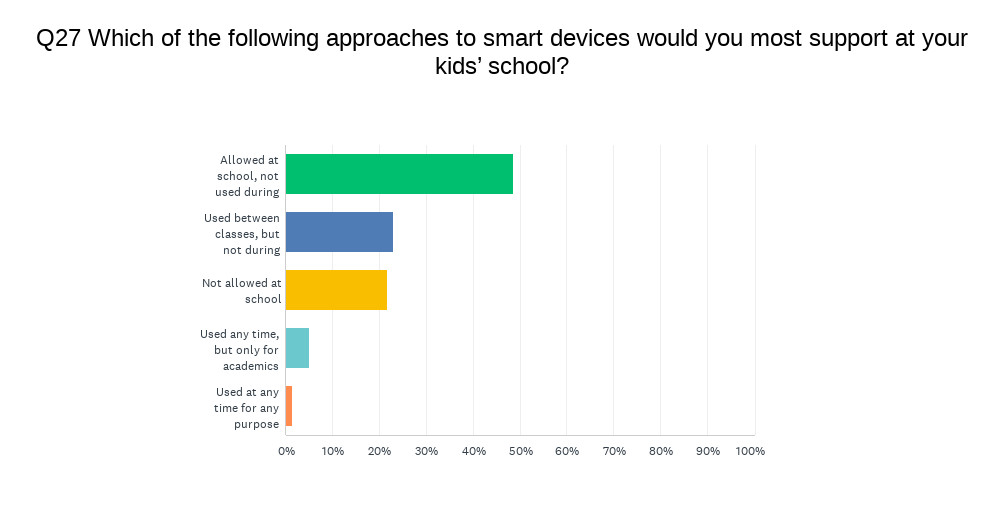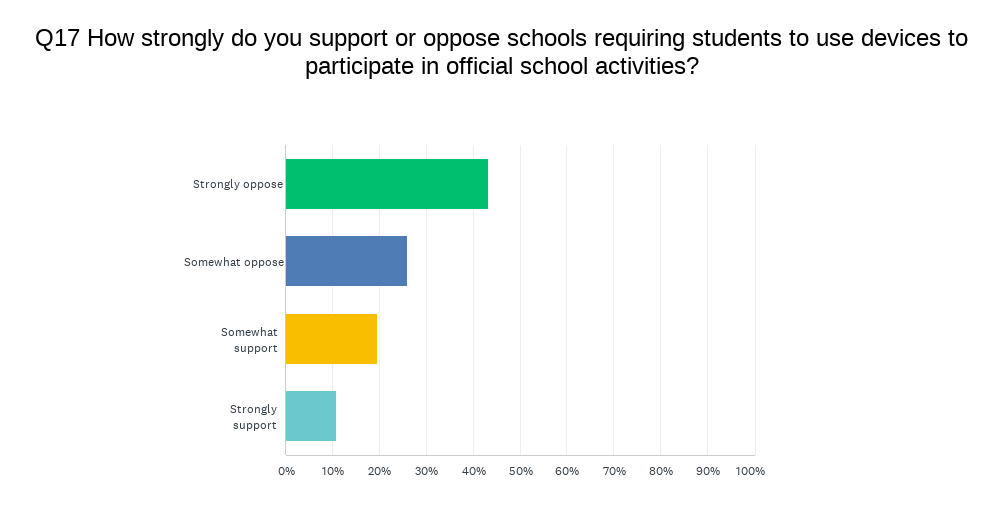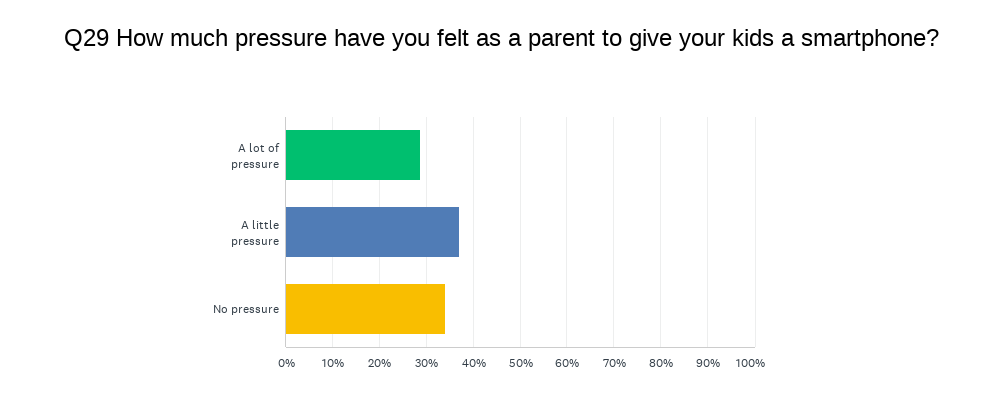As Kids Head Back to School, New Survey Reveals Parent Concerns About Smartphones in Schools

This fall, thousands of kids will head back to school in districts with new smartphone policies, in many cases bans, in place. From New York to California, school districts are cracking down on phones in schools, citing learning distributions, student mental health concerns, and more. Last year, the American Federation of Teachers and partners released a report detailing how smartphones in schools were negatively impacting educators and students.
ParentsTogether Action, a nonprofit parent and family advocacy group that represents more than 3 million families across the US, wanted to understand how parents feel about phones in schools. We asked 1000 parents, and here’s what they told us.
Parents Support Limits to Phone Use at Schools

The plurality of parents (49%), support policies that smartphones should be allowed on school grounds, but not allowed to be used during school hours. However, 1 in 5 parents would prefer to ban phones from entering school grounds altogether, and another 1 in 5 parents support allowing phone use at school between classes or in other non-academic settings. The top 3 reasons parents give for supporting phones at school are to contact parents for rides or other scheduling needs, for emergencies or school shootings, and for their safety walking or driving to school. The top 3 reasons parents gave for being against phones at school are that phones are a distraction and disrupt learning, phones are addictive or unsafe, and school is a place kids should be building in-person social skills.
“My daughter feels safer if she knows she has her phone with her and can contact me in an emergency. However, I don’t think the phone should be allowed during class as it is a big distraction and interferes with the teacher.” – Parent of a 9th grader
Despite these clear preferences, 1 in 3 parents don’t even know if their child’s school has a smartphone policy, much less what it is.
School Policies May Be Enforced Inconsistently Enforced Across Students
Parent perspectives on phone policy enforcement vary by race, LGBTQ+, and disability status. A plurality (46%) of parents say phone policies are strictly enforced in all situations for all students, however parents of color are 2x as likely as white parents to say phone policies are enforced “in some situations or for some students.” Parents of LGBTQ+ and disabled or special needs students are also 2x as likely as other parents to say phone policies are enforced “in some situations or for some students.” Similarly, most parents (60%) say their child’s school policy is just “just right,” however Black parents are 4x as likely as white parents to describe their child’s school’s phone policy as too strict. Hispanic/Latinx parents are 2x as likely as white parents to say the same.
“My daughter has had her phone taken away at least once for having her phone out during classroom hours.” – Parent of a 12th grader
Parents Don’t Like That Many Schools Require Device Use

Parents oppose schools requiring devices or social media for school activities, even though many schools have those requirements. 1 in 4 students uses their phone to engage in official school activities, with the most common uses being to receive assignments, receive information about events and schedules, and participate in study groups. 69% of parents oppose schools requiring students to use a phone to participate in school activities, with 43% strongly opposed. Fewer students, 1 in 12, use social media to engage in official school activities, with the most common platforms being Instagram and YouTube. More parents (86%) oppose social schools requiring students to use social media to participate in school activities, with 65% strongly opposed.
“They read on an app and do math on an app and math website.” – Parent of a 3rd and 5th grader
Devices Are Common At School, Though Sometimes Mistrusted
Most kids take their smartphones to school every day. 60% of parents of kids in PK3 – 12th grade said their kids have their own smartphones. Of those kids, the vast majority (73%) take their smartphones to school every day. Parents of LGBTQ+ kids are 50% more likely to say their kids take a phone to school every day than parents of straight and cisgender kids. Parents of disabled and special needs kids are slightly more likely (20%) to say their kids take a phone to school every day, and Black and Hispanic parents are also slightly more likely (10%) to say their kids take a phone to school every day than white and Asian parents.
Most kids also have school-issued devices, and parents are split between trusting those devices and worrying about them. 81% of parents say their kids have school issued devices, and 61% of those devices come home with kids. Most (52%) parents expressed some concern about the privacy and safety of their kids’ school issued devices. 48% trust school-issued devices completely.
“There was a firewall for inappropriate content, but 4th graders hacked it all the time, so the school just gave up. Our school felt powerless to do anything or manage it. – Parent of a 4th and 8th grader
Most Parents Feel Pressure To Get Their Kids a Phone, Many Cave Before They’re Ready

Most parents say they feel pressure to get their kids a smartphone, and many give into that pressure before they feel ready. 66% of parents said they felt pressure to get their kids a phone, with 1 in 4 saying they felt “a lot of pressure.” Black parents reported feeling the least pressure to get their kids a phone, and white and Asian parents reported the most. Parents of LGBTQ+ kids reported feeling more pressure to get their kids a phone than parents of straight and cisgender kids. The top reasons parents feel pressure is kids pestering them for phones (61%), peer pressure from child’s friends (56%), and needing a way to be in touch with their child (55%). 1 in 3 parents said they didn’t feel ready for their child to have a phone when they bought them one.
Most kids get their first phone before they’re old enough to use social media. 60% of parents of kids in preschool – 12th grade said their child has their own phone. 10% of kids with phones got their first phone at age 6 or younger. 72% of kids with phones got their first phone at age 12 or younger.
“Our children became obsessed with staring at a screen, at home and at school. Our oldest daughter is eight and began saying that she looked fat and didn’t want to show her belly …. Reading group chat from our 12-year-old son is enough to make you want to vomit… the potential damage is terrifying.” – Parent of a 3rd grader and 7th grader
“Parents have made it clear that while they see value in kids and teens using phones before and after school, they shouldn’t be a distraction during the school day,” said Shelby Knox, Director of Online Safety for ParentsTogether. “Schools should ensure they are listening to parents when developing phone policies, communicating phone policies with families, and enforcing those policies fairly across all student demographics. Big Tech companies also need to make their products and platforms safer for kids, so the entire job of protecting children doesn’t fall on already stretched teachers and parents.”

